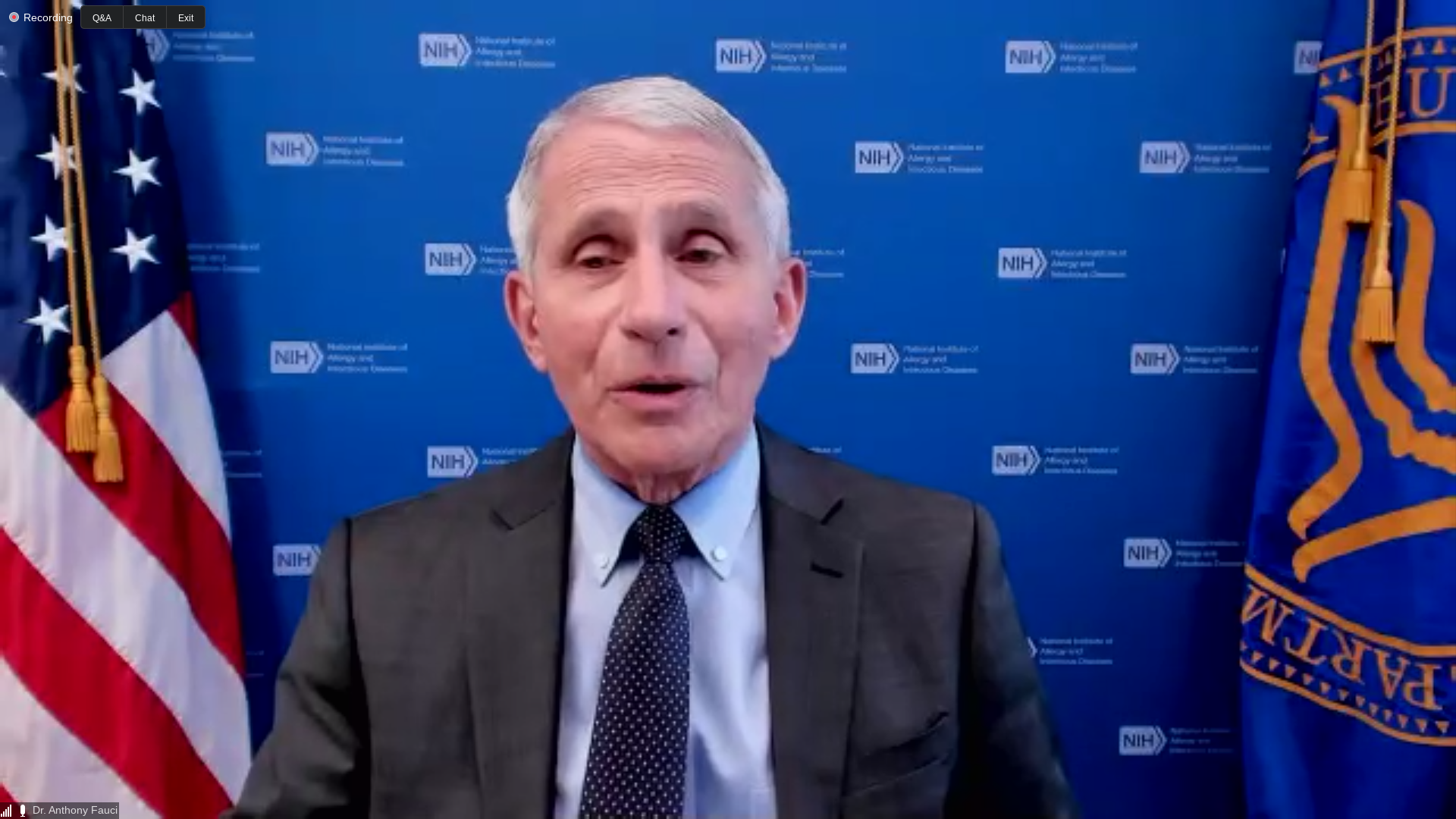
Screenshot via Florida International University

Audio By Carbonatix
Speaking at a virtual panel hosted by Florida International University (FIU), the U.S.’s top infectious-diseases expert said the nation is reaching the end of the pandemic tunnel – but Dr. Anthony Fauci warned against the temptation of declaring an end to COVID-19 too soon.
At a session of FIU’s annual Hemispheric Security Conference held over Zoom yesterday afternoon, Fauci – the director of the National Institute of Allergy and Infectious Diseases – spoke about the current trajectory of the pandemic and how the U.S. and other countries in the Western Hemisphere can expect to handle COVID in the home stretch. (A recording of the Zoom meeting is embedded at the end of this article.)
“We have suffered very, very dearly through this in our part of the world, but we’re seeing the light at the end of the tunnel,” Fauci said, referring to the status of U.S. vaccination efforts.
President Joe Biden recently announced that almost 60 percent of adults in the U.S. have received at least one dose of the COVID vaccine, and the White House aims to vaccinate at least 70 percent of U.S. adults by July 4.
While that’s a positive sign for North Americans, Fauci said the same vaccination rates are not being seen in less-developed nations as they struggle to build up vaccine supplies and immunize their populations. In order to get the world out of the pandemic and avoid massive mortality in places like Brazil, where coronavirus death tolls remain high even among children, Fauci encouraged cooperation among countries that have vaccine supplies and medical infrastructure to help other nations in need.
“As an area of the world together with other developed nations that have the resources and capability to take care of our own, we do have the moral responsibility to pull together and make sure we get doses of vaccine in an equitable manner to other areas of the world,” Fauci said.
As more people in the U.S. become immunized, Fauci said, we are closer to controlling the virus, if not fully destroying it.
He said there are three outcomes when fighting infectious diseases: eradication, elimination, and control.
Eradication is when a disease becomes completely extinct, like smallpox. Elimination comes when there are no longer any cases of a disease in a specific area and the disease is negligible, such as with polio and measles. Control, on the other hand, is when a disease is managed to the point that there are only occasional, isolated cases, rather than massive outbreaks.
Fauci said the U.S. is likely to control COVID – but only once the overwhelming majority of the population is vaccinated.
“Vaccination, vaccination, and vaccination. It’s as simple as that,” he said. “We have been fortunate enough that we have a highly effective series of vaccines – not just one – that if we vaccinate the overwhelming portion of the population, we can get to that strict control.”
Until that happens, Fauci said, people should maintain behaviors like mask-wearing and social-distancing, and governments should be slow to repeal public-health precautions to avoid the risk of another outbreak. Lifting all COVID-related restrictions all at once before everyone is vaccinated – as Florida Gov. Ron DeSantis did earlier this month – could be dangerous, Fauci warned.
“One of the things we have to be careful of – because we’ve gotten burned, and other countries have gotten burned before – is to declare victory prematurely and to just open up completely without any plan for how you’re gonna handle any, even small, resurgences of infection,” he said.
As of yesterday, about 46 percent of Floridians have received at least one vaccine dose and about 36 percent are fully vaccinated, according to Florida Department of Health data. In Miami-Dade County, 52 percent of the population has received one dose and about 40 percent has been fully vaccinated.
In trying to vaccinate the remaining parts of the population in the U.S. and abroad, some public-health officials have raised concerns about how to reach people who are vaccine-hesitant – those who don’t want to get the shot for some reason, such as being unsure of how the vaccine might affect them.
Fauci encouraged countries with vaccine-hesitant populations to reach them by first understanding where their hesitancy comes from and then addressing their concerns, rather than criticizing them.
“It really has to be a situation of treating people who are hesitant not in a finger-pointing manner or in an accusatory manner but trying really to understand why they’re hesitant,” Fauci said.
He pointed to the U.S. Department of Health’s creation of the COVID Community Corps – where community members can volunteer to share facts on vaccine safety and answer questions from friends and family and on social media – as an example of how other nations might overcome hesitancy with their own people.
As we pull out of the pandemic and reach the “light at the end of the tunnel,” Fauci said, the U.S. should look toward developing therapeutic medicines that can help people who contract COVID reduce the severity of their cases.
“If we could get a few drugs that directly block virus replication, that you can immediately treat in an oral regimen for people who begin to get symptoms, hopefully we can avoid the progression to hospitalizations, which we see in so many people,” he said.
Fauci also encouraged the U.S. and other countries to remain vigilant even after the pandemic is over, by monitoring new diseases as they emerge and being prepared to develop vaccines as soon as possible.
“I don’t think that we can stop the emergence of new pathogens,” Fauci said. “What our job is, is to prevent new emerging pathogens from becoming pandemic. That, I think we can do.”